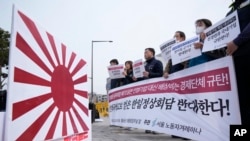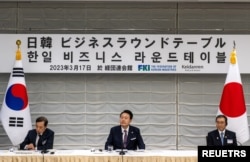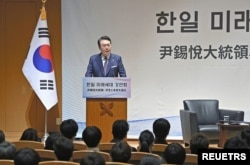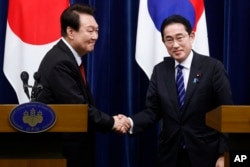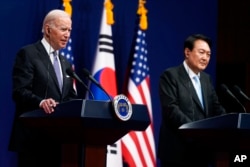South Korea’s left-leaning opposition forces blasted the country's president, Yoon Seok Yeol, on Friday as he returned from a summit aimed at opening a new era in South Korean-Japanese relations.
Yoon on Thursday became the first South Korean president in 12 years to hold a bilateral summit with his Japanese counterpart when he met Prime Minister Fumio Kishida in Tokyo.
The two agreed to restore regular visits to each other’s countries, took steps to ease trade tensions, and vowed to strengthen security cooperation to deal with shared threats such as China and North Korea.
The summit results were not enough to satisfy the South Korean left, which fiercely opposes Yoon’s efforts to look past historical disputes that have long strained relations with Japan.
“Yesterday’s Korea-Japan summit was the most embarrassing and disastrous in South Korea’s diplomatic history,” said Lee Jae-myung, the head of the main opposition Democratic Party.
Speaking at a party meeting, Lee said it looked “as if we were paying tribute to Japan, begging for reconciliation and surrendering.”
The backlash, though largely expected, highlights the challenge Yoon faces in moving ahead with efforts to improve Japan ties.
Forced labor proposal
Last week, Yoon unveiled a plan to resolve one of the thorniest disputes between the two countries – Japan’s use of forced labor during its brutal 1910-1945 occupation of the Korean Peninsula.
Under Yoon's plan, Seoul dropped a demand that Japanese companies compensate South Korean forced labor victims; instead, South Korean businesses will offer compensation through a government-backed foundation.
About 60% of South Koreans oppose the plan, according to multiple opinion polls.
A collection of left-leaning politicians and activist groups have called for demonstrations against Yoon’s forced labor proposal, recalling large anti-Japan protests in Seoul in 2019, during the peak of the forced labor dispute.
Yoon’s calculus
It is not clear how much any backlash will hurt Yoon, whose approval rating is already relatively low – just 33%, according to a poll released Friday by Gallup Korea.
Yoon still has more than four years left in his five-year presidential term. Like all South Korean presidents, he is constitutionally barred from running for a second term.
He may be betting that political pressure related to the forced labor issue will lessen by the time his party must field a candidate for the 2027 presidential elections, according to Mason Richey, associate professor of international politics at Seoul's Hankuk University of Foreign Studies.
“That’s the gamble Yoon is making – I think he’s pretty much willing to take the heat for the moment,” Richey said.
Shaky ground
The question is whether the Democratic Party will eventually stop using the issue to attack Yoon – and whether the country’s next liberal president will undo the forced labor proposal.
Recent history suggests Yoon’s efforts are on shaky ground.
In 2015, South Korea’s last conservative president, Park Geun-hye, reached an agreement under which Japan would compensate South Korean women who were forced into sexual slavery. President Moon Jae-in, a liberal, later repudiated the deal.
If Yoon is unable to convince his political opponents of the merits of the proposal, then it will meet a similar fate, predicted Robert Kelly, a political science professor at South Korea’s Pusan National University.
“This is a pretty big rock that Yoon’s got to roll up the hill,” Kelly said. “And Kishida’s got to give him some help or it’s not going to work.”
Historical matters
So far, there are few signs Japan will agree to the kinds of concessions demanded by South Korean progressives, such as a fresh apology over wartime atrocities or direct compensation for forced labor victims.
At Thursday’s summit, Kishida did not offer a new apology. Instead, he reaffirmed that the Japanese government “inherits on the whole the historical perceptions of past governments,” including a 1998 declaration that included an apology.
Speaking alongside Kishida, Yoon said he has no plans to seek reimbursement from Japan.
Japan insists the forced labor and all other compensation issues were resolved by a 1965 treaty that established relations between Japan and South Korea. Under the treaty, South Korea received $300 million in economic aid and $500 million in loans from Japan.
However, South Korean forced laborers began demanding compensation starting in the 1990s and subsequent South Korean court rulings have sided with the victims.
Shared challenges
For many South Korean conservatives, there are bigger issues at stake – such as dealing with the rapidly expanding North Korean nuclear missile threat and securing global supply chains.
“This is why Yoon proposed a solution to the issue of forced labor despite huge political risks," read an editorial in the conservative Chosun Ilbo newspaper. "This summit offers a chance to make things right again."
Choi Eun-mi, a researcher at the Seoul-based Asan Institute, said Yoon’s proposal was not meant to be a comprehensive solution to the forced labor issue, but represents an important first step.
“There is no way to satisfy everyone,” Choi said. “I wish we could, but it’s not that easy.”
U.S. President Joe Biden last week praised Yoon’s proposal, saying it marks "a groundbreaking new chapter of cooperation and partnership between two of the United States’ closest allies."
Improved Japan-South Korea relations could be hugely beneficial for the United States, which has long sought greater trilateral cooperation on regional threats.
Some U.S. analysts believe the Japan-South Korea rapprochement may outlast Yoon and Kishida, given China’s increased military assertiveness and North Korea’s near-constant missile tests and other threats.
At least for now, many South Korean opposition politicians seem to disagree.
Ko Min-jung, a senior Democratic Party lawmaker, told VOA on Friday it is possible for South Korea to both deal with its security challenges and avoid what she called “surrender diplomacy.”
“There is good reason to question the benefit of South Korea giving up everything, unconditionally, to Japan,” she said.




